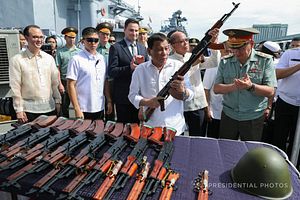For the third time since 2016, the Philippine government has relaunched the controversial anti-drug campaign, known locally as Oplan Tokhang, amid continuing concern that the police-led operations have led to massive human rights abuses.
Tokhang has long been a top priority of President Rodrigo Duterte, who vowed to eradicate illegal drugs in three to six months after his rise to power in 2016.
But soon after it began, Tokhang was unsurprisingly blamed for the spate of extrajudicial killings in urban poor communities, with the police claiming that they were only forced to retaliate because suspected drug operators and peddlers were resisting arrests.
Duterte suspended Tokhang in early 2017 after some police were accused of illegally abducting a South Korean businessman under a Tokhang operation. Several months later, the police resumed Tokhang which quickly produced a surge of drug-related killings all over Metro Manila, the nation’s biggest urban center.
But it was the mysterious deaths of teenagers under police custody last August 2017 which generated a loud public outcry against Tokhang. This inspired the biggest anti-Tokhang gathering in September and it was also credited with partly causing a drop in the nationwide trust rating of Duterte.
Bowing to public pressure, Duterte removed the police from the anti-drug campaign in October and transferred the mandate to the Philippine Drug Enforcement Agency. By this time, the Duterte government had already been accused of conducting a ‘war on drugs’ that had claimed the lives of more than 13,000 people, according to some estimates by human rights groups.
On 29 January 2018, the police resumed its role in implementing Tokhang under a new set of guidelines designed to restore public confidence.
What are some of the new features of the reloaded Tokhang? First, the police supposedly underwent rigorous retraining in the past several months. Second, Tokhang operations will apparently be conducted by a group of four policemen only on weekdays and during office hours. Third, the police will only visit the houses of those listed in the drug watchlist which should be based on verified intelligence reports. Suspected drug personalities will be invited to surrender to the nearest police station or barangay (village) hall.
Furthermore, the police are allowed to invite the media, church groups, and members of civil society to join and monitor the Tokhang operations. The police are also encouraged to bring a bible, the holy rosary, and other religious materials to encourage drug suspects to peacefully surrender.
To enforce discipline, the police now has a one-strike policy wherein a precinct commander will be relieved from his post if one of his Tokhang teams violated the new guidelines. The police provincial director and regional director will be relieved from duties as well if several precinct commanders were found guilty of violating the new rules.
Since its relaunch, the police claimed that 2,127 Tokhang operations succeeded in forcing the surrender of 821 drug personalities. Some police officers said the Tokhang campaign is now ‘bloodless’. That may not be entirely accurate, because there were several news reports about Tokhang-related killings on the same week when the police resumed its anti-drug operations.
Human rights groups were also skeptical of the rebranded Tokhang. Karapatan characterized it as “a superficial makeover of a policy that has earned public condemnation.” It added that Tokhang remains a short-sighted solution because it relies purely on a militarist approach in solving a comprehensive, deep-rooted problem. The group warned that the new Tokhang will also fail if corruption is not curbed in the ranks of the police.
Meanwhile, the Catholic Bishops’ Conference of the Philippines urged the police to focus on issues that matter most to the public instead of engaging in ‘theatrics’ like the bringing of religious items during Tokhang operations.
For Philippine police chief Ronald de la Rosa, the new Tokhang aims to prove that the police can be trusted in solving the drug menace.
“There is an ongoing internal cleansing in our organization. What we are doing right now is to prevent that the mistakes of the past won’t be repeated,” he told the media.
This statement is significant, since it constitutes a tacit admission that Duterte’s ‘war on drugs’ has repeatedly failed despite being the main agenda of the government.
But the relaunch of Tokhang, despite its notorious record, could be less about enhancing the image of the police than a political tool intended to revive panic among the poor and discourage the rest of the population to challenge the president who has already stated his intention to amend the 1987 Constitution this year, a divisive move that could spark a political crisis as the ruling party attempts to further consolidate its power.
For this and other reasons, the police spin on the relaunch of the ‘bloodless’ Tokhang is likely to fall on deaf ears to informed observers in the Philippines. Ultimately, the seeds of doubt with respect to Duterte’s war on drugs are tied not to opposition to the president for opposition’s sake, but legitimate fears that it could be used to silence not just drug suspects but also the critics of the Duterte government. Multiple relaunches of failed policies are unlikely to resolve that underlying distrust.

































